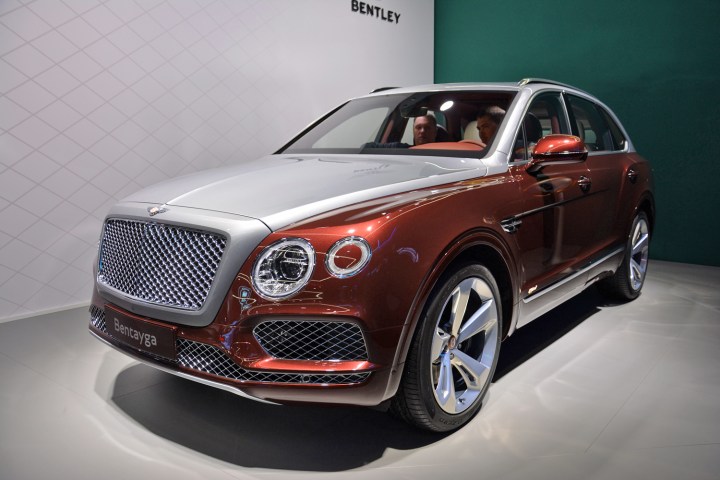The Bentayga Hybrid Bentley introduced at the Geneva Auto Show is the first of its kind, but it’s certainly not the last. The whole Bentley range will have an electrified option by 2025, even models like the Continental GT and the stately Mulsanne. The lineup will include at least one battery-electric car, too.
Digital Trends sat down with Peter Guest, the director of the Bentayga line, to get his insight into the British company’s first-ever plug-in hybrid model and what it means for its future.
DT: Bentley just embarked on an electrification offensive. Why start with the Bentayga?
PG: That’s a good question. There are a number of reasons. I think the Bentayga is the obvious starting point from a package point of view. Obviously, a battery pack takes quite a lot of space. You need a lot of space to install the battery pack. An SUV is ideally placed from a package point of view. The battery pack goes in the rear of the car.
We wanted a seamless transition between electric drive and petrol drive. That was a new calibration skill that we had to learn.
There’s also a logic from a functional point of view. Our aim with our plug-in hybrids is to maintain the traditional Bentley values. We’re talking about power, performance, and grand touring. What we’ve also found, particularly in electric-only mode, is how incredibly quiet the car is. There is absolutely no noise; nothing. You’re completely isolated from your environment.
Were there any challenges involved in making it totally silent? Often times, automakers bring out a whole lot of wind- and tire-related noise when they replace an engine with an electric motor.
We were very lucky when we developed the hybrid. We already targeted Bentayga to be the refinement benchmark. When we started doing our benchmarking work, at the beginning of the development process, we found there was no SUV we would consider to be a refinement benchmark. Our benchmark became the Mulsanne and the Flying Spur. So, at the start of PHEV development, we already had a very strong base.
Did Land Rover’s Range Rover not cut it?
Not in refinement, no. In many other ways it did. We love the Range Rover, it’s a fantastic car.
Have you announced the specifications for the hybrid?
No, we just said it’s a V6 and an electric motor. We’ll announce full specifications closer to the market launch. What we can say now is it will have more than 400 horsepower and 100 of those will come from the motor. It will be a credible Bentley in terms of performance.
Were there any challenges in making the Bentayga a hybrid?
One of the things was that we wanted a seamless transition between electric drive and petrol drive. That was a new calibration skill that we had to learn. We never had that combination of petrol and gasoline working together. What we didn’t want was a clunky transition between the different drive modes. Getting it seamless was an incredible calibration task Bentley had to take on. I think we did it.
This idea that PHEV technology is a transition technology is an interesting one but for us it’s a very valid technology in its own right.
What lessons did you learn from the development process that you can apply to your other cars as you expand your portfolio of hybrid models?
The main lesson is the opportunities that combined electric and petrol drive gives us. The opportunities in terms of performance, the opportunities in terms of access. This idea that PHEV technology is a transition technology is an interesting one but for us it’s a very valid technology in its own right because it makes an awful lot of sense. You can drive to the city in hybrid mode, put it in electric-only mode, and switch back to hybrid mode when you drive out of the city. It’s a fantastic combination of technologies in one car. You’re never going to get stuck with a plug-in hybrid.
Are you worried about hybrid powertrains adding weight to your cars?
The battery pack will always be in the back. You end up with a lighter engine and a battery pack in the back. Interestingly, you also end up with a better weight distribution front to rear. Our cars are quite front-biased. When you go hybrid, the car is overall heavier but not as much as people think and it’s got a better weight distribution. It gives you a more dynamic feel than you might expect. Our aim with the hybrid is not primarily performance, it’s a combination of luxury, refinement, and performance.
What’s next for the Bentayga?
We’re not going to stand still. If you look at what we’ve done since we launched the Bentayga at the end of 2015. We launched the diesel variant in some markets in the last year, we launched the V8 early this year, we’re launching the hybrid now. We have a lot of ambition to continue the evolution and continue the development. We’re still learning about the new sector that we’re in. We were the first ones on the market. We did a lot of research to try and figure out exactly where we were going with it. We’re getting that feedback now. We will adapt and evolve our offering as we get that feedback. We absolutely don’t stand still. There will be more to come.
Editors' Recommendations
- 2022 Mercedes-Benz EQB first drive review: An EV better than its gas sibling
- Rivian won’t start delivering its electric pickup truck until 2021
- Lincoln will launch its first electric vehicle with help from Rivian
- BMW will launch an electric version of one of its most popular models in 2020
- Why General Motors won’t be showing its next electric car at CES







